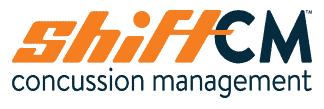We often receive questions about what happens during your first visit at Shift when you get a concussion…
At Shift Concussion Management, all of our rehabilitation professionals are trained on the same concussion program. So, your assessment will be identical whether you see a Physiotherapist, Osteopath or Chiropractor for your first visit at our facility!
History
Your rehabilitation practitioner will ask you detailed questions about how the concussion occurred, and if there was any loss of consciousness (which doesn’t always happen), temporary amnesia, or immediate onset of symptoms such as headache, dizziness or neck pain.
Next, they will delve into the symptoms you are experiencing and how they impact your daily life at home, work, and with leisure activities. They will also ask if you have seen your family doctor or any other health provider since the injury or have had any special imaging or laboratory tests completed. If you have undergone any imaging such as MRI, X-ray or CT, note that these tests do not diagnose concussions. Rather, these images are often used to rule out more significant injury such as bone fractures or bleeds. Most concussive injuries do not require advanced imaging.
Lastly, your medical history will be reviewed to identify anything that may hinder your recovery or should be investigated further with your family doctor. This will include any previous conditions you were diagnosed with, and any concussions you may have had in the past.
Physical Assessment
For the physical part of the assessment, your rehabilitation professional will use the information from the history to guide their evaluation. Your examination will consist of specific functional testing done in a clinical setting. If your main complaint is dizziness and headache for example, your Shift Provider may focus more on examination tests related to those particular symptoms to determine the root cause and most appropriate course of treatment.
Generally, the assessment will start with a series of neurological tests to help rule out more serious injury that may require immediate medical attention. Even if you’ve already been seen by a medical provider and have received a concussion diagnosis, it’s important that we take a comprehensive approach to ensure that nothing has changed or significantly deteriorated since you were last examined.
Next, your provider may look at your balance with closed eyes, standing still and on a foam pad. After that, they will look at how you walk with your feet at different widths and even with your eyes closed to see how your balance systems function. Sometimes your balance can be off with a concussion without your awareness. Subtle balance deficits are common and can persist if not corrected.
The next part will involve a series of assessment procedures known as the Vestibular Ocular Motor Screening (VOMS). These tests evaluate eye tracking and eye-head coordination to see how your visual and vestibular systems are functioning. These tests commonly elicit symptoms for many concussion patients and may help us determine if vestibular rehabilitation therapy may be a useful treatment strategy in your case, or, if a specialized optometric referral may be warranted.
Additionally, your rehabilitation professional may do some special tests to check for vertigo if you are experiencing severe dizziness that is triggered by changes in posture or with exposure to certain types of motion in your environment.
Lastly, your practitioner may perform examination tests for neck or jaw pain to see if any symptoms may be associated with injury to these areas. It is essential to assess these areas (whether you have pain or not), since a type of headache and dizziness can arise from the muscles and structures of the neck. Whiplash is a common condition that accompanies concussion and may contribute to your overall symptom patterns.
In a follow-up visit, if you have cognitive complaints such as memory or concentration issues, an online cognitive test can be administered called ‘Creyos.’ This is an online cognitive assessment tool to show an objective measurement of your cognitive health. This will guide your treatment plan and if objective findings are found, a referral to Occupational Therapy may be indicated.
Additionally, if you are an athlete or have tried to exercise post-concussion and noticed symptom elevation, a Buffalo Concussion Treadmill Test may be performed on your next visit. This is a validated test to measure the amount of cardio exercise that is tolerated even in the early phase of concussion recovery. It is done by monitoring heart rate every minute while walking on a treadmill at a defined pace with incline increases every minute. This is done to identify the heart rate threshold at which concussion symptom elevation occurs. Your rehabilitation professional will use that information to provide you with an aerobic exercise plan for home. Over time, your healthcare provider will increase the intensity of your home exercise program to help raise your threshold until symptoms are no longer experienced with exercise.
Plan of Management
Once all of the history and physical examination findings are compiled, your healthcare provider will form a clinical impression and provide you with education surrounding the findings of your assessment, your injury and diagnosis, what to expect from your recovery, and whether any specific treatment and rehabilitation strategies would be beneficial.
Some common rehabilitation strategies used at Shift include Vestibular-Ocular rehabilitation therapy, treatment and rehabilitation for the neck, exercise and activity-based rehabilitation, cognitive support strategies as well as mental health supports. Your rehabilitation provider will determine which strategy would be the most effective based on your history and physical exam.
In addition, you will also receive information on physical activity recommendations, return to work, and school guidelines, and, if you are an athlete, return to play guidelines. At the end, any questions you may have will be answered.
If you are struggling to recover from a concussion and coming in for an assessment, this is what you can expect from your first visit. We have an incredible team of knowledgeable and caring health professionals who are here to help!


Leave a Reply